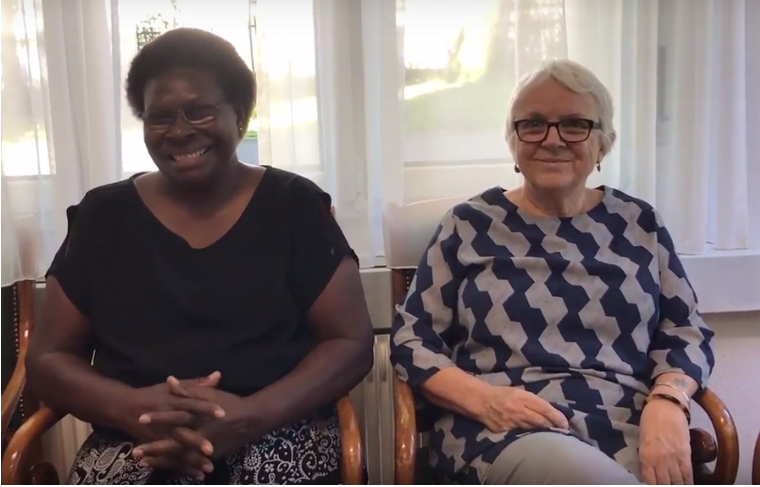
Papua New Guinea activists Ruth Saovana Spriggs (left) and Sabet Cox in Geneva. Image still from forthcoming IWRAW Asia Pacific video.
By Nikta Daijavad
At IWRAW Asia Pacific’s From Global to Local training programme, run in parallel to the 70th CEDAW Session, we were joined by two activists from a small group of Papua New Guinea women working to expose the gendered harms of Australia’s largescale extractive industries – which have operated across many provinces of Papua New Guinea for five decades. Dr Ruth Saovana Spriggs (left, above) is the director of the Bougainville People’s Research Center (based in the Autonomous Region of Bougainville), and Elizabeth (Sabet) Cox (right, above) is a technical advisor to HELP Resources and Voice for Change (based in the Sepik and the Highlands regions of Papua New Guinea) and an emerging women’s organisation in Hela – the site of Papua New Guinea’s controversial vast and expanding gas fields in a context of underdevelopment and armed conflict. These four local NGOs were supported by Development Alternatives with Women for a New Era (DAWN), to prepare and submit a shadow report to the CEDAW Committee’s review of Australia, held on 3 July 2018.
Ruth and Elizabeth focused their advocacy on Australia’s failure to meet its extraterritorial obligations (ETOs) in relation to its financing of, and development cooperation with, risky and socially and environmentally destructive Australian extractive companies in Papua New Guinea. In recent years, activists have increasingly called upon states to fulfill such obligations. Relying on the Maastricht Principles on Extraterritorial Obligations in the Area of Economic, Social and Cultural Rights, they argue that states are obligated to ensure that non-state actors which they are in a position to regulate, including private individuals and transnational corporations, do not violate human rights. The Women’s International League for Peace and Freedom, for example, submitted shadow reports on the extraterritorial obligations of Spain, Sweden, and France with regards to arms transfers for the 61st, 63rd, and 64th CEDAW Sessions, respectively. FIAN International similarly submitted a shadow report on the extraterritorial obligations of Germany with regards to coffee plantations owned by German transnational corporations that were illegally evicting peasant communities in Uganda (66th CEDAW Session).
In Australia’s case, the state has provided critical financial support to extractive industries that have been assessed as high-risk for social and environmental impacts. In Bougainville, for example, Rio Tinto of Australia operated the Bougainville Copper Limited mine between 1969 and 1989 – until tensions over the dumping of tailings in the Jaba River, grossly unequal benefit sharing arrangements, and an influx of migrants from other provinces eventually erupted into a decade-long civil war with the Papua New Guinea government, with military support from Australia. When a military response failed, Papua New Guinea imposed a total blockade on goods, services and supplies, resulting in the loss of an estimated 20,000 lives, and countless war crimes of sexual violence. Ruth’s research has revealed that local women lost their traditional matrilineal authority, especially in relation to land rights and decision making. They witnessed huge social and cultural upheaval, bore the brunt of a long armed conflict and barely received USD20 in cash benefits annually.
The Australian government’s secretive Export Credit Agency – the Export Finance and Insurance Corporation (EFIC) – provides critical loans to ‘close the deal’ on new projects operated by Australian extractive companies when risk-averse banks will not. In 2009 EFIC provided a AUD500 million loan to enable Exxon Mobil and joint venture partners Oil Search and Santos to proceed with a liquefied natural gas project in the remote Hela region, despite warnings that support for the project could exacerbate already-existing armed conflict and violence against women. The lessons from Bougainville and from a succession of mining disasters have not been learned, and the gas fields in remote Hela Province have created a nightmare situation for women. The gas project start-up ignored the land-based armed conflicts among men and the extreme forms of sexual and gender-based violence against women and girls. Worsening armed conflicts have undermined Hela’s rudimentary governance, service delivery and justice systems and rising impunity for daily murders, assaults and rapes.
Ruth and Elizabeth advocated four priority obligations of the Australian government:
- guarantees of women’s security and access to justice in areas impacted by Australian extractive industries, including establishing a complaints mechanism to provide reparations for past harms;
- Australian companies to undertake substantive gender analysis and to ensure women give free, prior and informed consent prior to extractive project start-up;
- institution of gender-equal benefit sharing in land-owning and impacted communities; and
- gender-equal access to jobs and training in Australian-owned extractive industry companies.
Throughout the process, women leaders from the remote Hela province in Papua New Guinea communicated daily with Ruth and Elizabeth, expressing their great hopes that their voices would be heard. They have since expressed their appreciation to the CEDAW Committee and the process.
During Australia’s constructive dialogue, Committee member Nahla Haidar directed incisive questions to the Australian state delegation regarding state loan financing of Australian extractive companies in Papua New Guinea and development grants to company-led corporate social responsibility projects for women. She noted, “There seems to be a failure to learn from the conflict in Bougainville … To what extent will the [Australian] government engage with the UN Principles on Business and Human Rights?” She reminded the delegation that its 2016 Universal Periodic Review had recommended that Australia adopt a National Action Plan on Business and Human Rights, and Australia had responded that it would consider further measures for implementation of the Guiding Principles on Business and Human Rights. This has not yet resulted in an adequate response.
The concerns highlighted in the shadow report on Australia’s ETOs are well reflected in Australia’s Concluding Observations. The Committee recommends that Australia develop a National Action Plan on Business and Human Rights, incorporating a gender perspective, ensuring that all largescale extractive projects have obtained free prior informed consent from locally affected women, and establishing a specialised mechanism to investigate violations of women’s human rights by corporations based or registered in Australia or receiving subsidies from it.
Despite the lack of a clear commitment from the Australian delegation to address this issue, Ruth remains hopeful that highlighting the nature of Australia’s extractive industries in the international arena will eventually have a positive impact. As she said in our interview, “Unfortunately I was a little disappointed, but at least [the Australian delegation] heard it … And to me, it is a plus that [the issue] is at least registered at this level.” She also believes that continuing to strengthen the relationship between academic research and advocacy-oriented spaces like CEDAW will help bring to light the depth and complexity of the human rights violations taking place in Papua New Guinea.
Elizabeth added, “It’s given me hope that we can do more back in Papua New Guinea, and because the autonomous region of Bougainville is preparing for independence, [this] can be a new starting point for them to hold their independent government accountable to address the rights of women in the new state.”
Bougainville is slated to hold an independence referendum on 12 October 2019.
Nikta Daijavad attended the 70th CEDAW Session as the Summer 2018 intern for IWRAW Asia Pacific. She is an International Law and Human Rights Fellow at the NYU School of Law and will be graduating in 2020.

